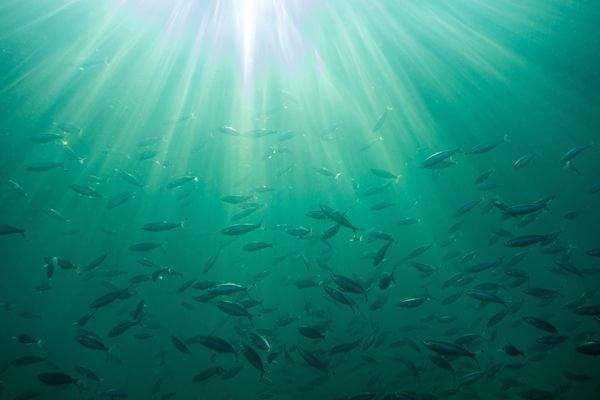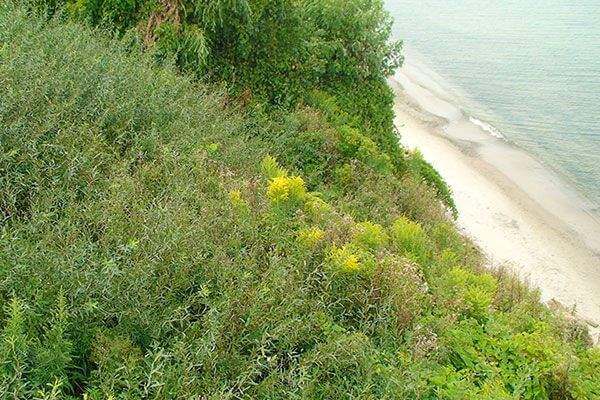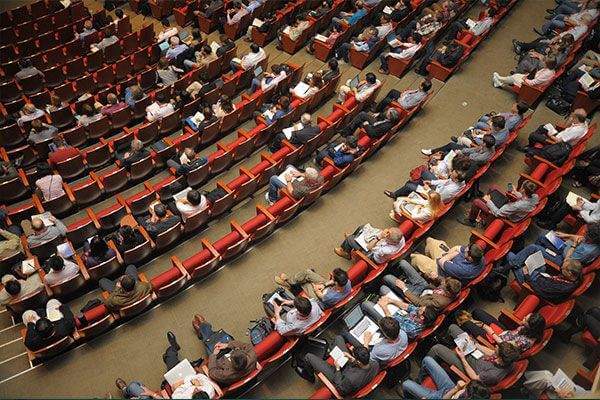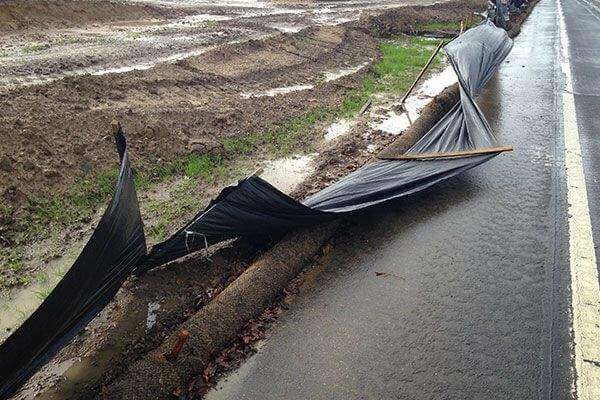Blog Archives

At Filtrexx, we are continuously studying and conducting research in the fields of compost and stormwater. A recent article reported that compost-based stormwater management practices can reduce hydrocarbon toxicity to fish.
The research was performed by Washington State University, Evergreen State College, the National Oceanic and Atmospheric Administration (NOAA), and the United States Fish and Wildlife Service, and was published in the scientific journal Environmental Science and Technology. Researchers found that dissolved hydrocarbons commonly found in stormwater runoff from urban watershed sources, such as highways, streets, and parking lots, can be toxic to aquatic organisms.
While most studies focus on the hydrologic and pollutant removal performance of stormwater treatment and green infrastructure practices, this study is one of the few that has focused on the biological indicators of the effectiveness of these practices – specifically, the ability to reduce toxicity exposure to aquatic organism, in this case zebrafish. They reported that compost-based media that filters stormwater can remove bioavailable cardiovascular toxic hydrocarbons from stormwater runoff leading to reduced cardiotoxicity, both visibly and through gene regulation in the developing fish. Researchers concluded that more studies should focus on the biological health indicators of stormwater treatment practices, and this type of green infrastructure management practice is a viable option to remove hydrocarbons that are toxic to fish, thereby protecting or improving both water quality and the health of fish in the receiving water body.
If you’d like to learn more about how compost-based products can remove pollutants from stormwater runoff, you can download our fact sheet, check out our research library or contact us for a free project consultation.
Dr. Britt Faucette, Ph.D., is an Ecosystem Scientist, CPESC, and LEED AP. He earned his Ph.D. from the Odom School of Ecology at the University of Georgia where he researched soil-water-plant performances of various BMPs used in soil erosion and stormwater management applications; served as a state specialist in storm water management, organics recycling, and pollution prevention programs; and served as an adjunct professor. Britt coordinates research, design, and training services for the stormwater and organic materials management industries and serves on technical committees and boards with ASTM, GRHC, CCREF, and IECA. In 2008 he was awarded the annual USCC Clean Water Award. Britt has authored numerous peer-reviewed and popular press publications and popular press articles, two books, federal and state specifications, and has been awarded nearly $500,000 in research grants.

Filtrexx may be showing its age, but we’ve been working in the Living Shoreline business for over 20 years. Over the years, we’ve seen this concept referred to as many terms: bank stabilization, stream restoration, shoreline erosion control, and various combinations of these terms. Conceptually the mission of protecting a shoreline is not different but our product designs have become more efficient, effective and sustainable, and public acceptance has grown dramatically with the product changes. Filtrexx never planned to get into the shoreline business, but some innovative engineers throughout the years have looked at Filtrexx as the most viable solution available and changed the status quo. Here are six reasons as to why you should consider Filtrexx Living Shorelines for your next project:
- We are the only company that offers a true growing face based on our beneficial use of recycled organics.
- We have experienced sales consultants across the United States that can provide design help you can’t find from another company.
- Our product is made in the United States and we promote the use of native plant species that are matched with your environment and specific location.
- We offer a flexible system that can be adapted to your project area with minimal land disturbance.
- Our system helps reduce the release of carbon into the atmosphere.
- We truly are committed to successful projects. We will not recommend a solution if we do not feel it will be successful over the evolution of your project.
We love working with design professionals and innovators in the conceptual stage of a project to help you pick the best solution for the project - contact us to collaborate on your next Living Shorelines project. If you’re interested in learning more, join me in Long Beach, California December 8-13 where I’ll be speaking at the 9th National Summit on Coastal and Estuarine Restoration and Management.
Jeff Opel has 30 years of experience in the natural resources industry. Many of those years were served as District Manager of several Soil Conservation Districts in Maryland.As District Manager Jeff was responsible for advancing new and innovative sediment and erosion control technology used during the construction process. Jeff also administered the State of Maryland’s Living Shoreline program in several Counties in the state and participated in the development of several stream restoration projects. New advanced technologies used included the use of Flocculating agents to increase the efficiency of existing sediment control techniques. Jeff also created designs for multi chamber sediment basins incorporating bio filters to increase trapping efficiency. It was at this position that Jeff became familiar with Filtrexx which was used with great success. Since leaving the government service after 20 years Jeff ran a field office for a civil engineering firm in Delaware, as well as several landscape companies, before coming to Filtrexx. With Filtrexx Jeff has worked in business development for the mid-Atlantic, and in Technical Sales support for the Southeast region. Presently Jeff represents Filtrexx as the Southeast Regional Sales Manager and is actively developing Filtrexx initiatives related to stream restoration and living shorelines.

Admittedly, I have attended several tradeshows in my years working in marketing for various companies. They usually are a lot of the same: dozens of booths filled with happy, chatty sales representatives, several interesting breakout sessions, networking events, and parties.
StormCon was my first foray into tradeshow life in the erosion control and stormwater management industries. We had Dr. Craig Kolodge and Colin Ewart from the West Coast there to man the booth, talk with customers and potential customers, and serve as stormwater gurus. This afforded me the opportunity to sit in and listen to several of the breakout sessions and try to absorb (ha ha) information. One session I sat in on was our very own Dr. Britt Faucette’s discussion: Ecosystem Service Benefits of Compost-Based Sustainable Management Practices (SMPs). You may have heard Dr. Faucette speak during one of his many webinars on pollutant removal and low-impact development because research and technical services are his forte.
Dr. Faucette’s presentation dove deep into how environmental SMPs use natural processes to achieve high performance results in biofiltration of stormwater, water conservation, and waste and carbon footprint reduction. He also discussed how these types of practices can be easily designed into stormwater management plans as well as how to calculate the outputs to prove that the SMPs you are using are working. What I discovered is that stormwater management really is a reoccurring challenge for most. What Filtrexx stormwater management products do is preserve as much of the natural site hydrology while also reintroduce natural components into the landscape. Our GroSoxx specifically help to prevent the occurrence of stormwater, distribute stormwater and its treatment across the landscape and filter stormwater pollutants prior to site discharge. One of the largest takeaways that I discovered is the importance of having a process and a plan in place for stormwater. Eliminating the unknown, the risks, the compliance issues and the potential fines by having SMPs in place is imperative.
Overall, I had a great time in Denver and I can’t wait to attend next year’s StormCon in Atlanta, GA!
As the Marketing Manager for Filtrexx, Teele works heavily in the digital and social arenas of marketing, running the Filtrexx Twitter, Facebook and LinkedIn pages. She also serves as writer and editor of press releases, project profiles and most recently, the Filtrexx blog. Teele attended the University of Wisconsin-Whitewater where she obtained a Bachelor of Arts in public relations and a Master of Science in corporate communication. Teele has worked in marketing roles for various companies around the Twin Cities before landing at Filtrexx in July, 2017.

In today’s economy everyone is looking for a way to save a dollar. After all, a dollar saved is a dollar earned. Sometimes the answer about how to save those dollars may not be as obvious as you think.
When considering options for erosion control BMPs, many people will look to save by the “give me the cheapest” approach. Sure, a roll of silt fence or straw wattle looks like a good idea up front. After all the material cost is cheap, all the people on the installation crew are familiar with how to install it and it’s a “no-brainer”.
You would be right with all of those assumptions. Including the “no-brainer” part, which implies that there is no thinking involved in the decision process.
Is it really the best BMP for your needs? Is it the best overall cost for you? Have you considered the cost of installation, maintenance, repair, replacement, removal and disposal costs over the life of your project?
4 reasons to consider Filtrexx compost SiltSoxx for your next project:
- Ease of installation – no trenching or digging required. Save on labor costs.
- Durability – on long-term projects, SiltSoxx lasts 2-3 years from installation. Save on maintenance costs.
- Repairable and reusable – on short-term small projects, SiltSoxx can be picked up and moved to the next site. Save on multiple purchase costs.
- Disposal – once SiltSoxx has come to the end of its usable life, cut and dispose of the mesh and spread the compost. Very little waste; save on disposal costs.
When you would like to know more, a Filtrexx representative can help you with a free, simple TOTAL COST comparison for your BMP needs to ensure that you are making the most educated choice for your business.

EcoPractices’ partnership with Filtrexx brings a unique perspective to the construction industry. Together, we challenge companies to look at their environmental stewardship missions. We look at sustainability as a risk. What are your risks related to compliance, permitting, local community, and ecosystems when you make every day decisions? When selecting a product for erosion control and stormwater management all of these factors should be considered.
Filtrexx is the leader in Sustainable Management Practices (SMPs) which is why EcoPractices is a proud partner to provide third-party verification of practices and environmental impact values quantification metrics to accompany Filtrexx products for their clients. EcoPractices provides quarterly update reports and annual Sustainability Analysis Reports that can be tailored to each client’s operation and needs.
Millions of miles of erosion control and stormwater management products are sent to a landfill every year. Filtrexx has developed the science behind the compost filter sock and perfected a Filtrexx SiltSoxx™ product that provides the highest function on the market while not only reducing our organic matter waste but reusing it and reducing the product waste at the end of its life. According to the US EPA, organic waste is the largest portion of solid waste entering our landfills with 61.7% of waste in 2012 being organic matter. Filtrexx and their clients are viewing waste products as a resource to reduce their local landfill footprint and reduced their carbon footprint while improving soil and water quality.
Many companies are missing the opportunity to reach their environmental goals with construction practices. Project Managers: Are Sustainable Management Practices being used on your construction projects?
Learn more about EcoPractices' partnership with Filtrexx.
As sustainable practices and environmental analytics manager for Sustainable Environmental Consultants (SEC), Jennifer Jensen assists in research and science behind providing practices that have documented and referenced beneficial impacts on the environment. She oversees SEC’s sustainability risk management platform called EcoPractices for consistent traceability, ensuring customer practices are indeed implemented and done so according to standards set by industry and or government organizations. Jenny maintains the necessary documentation to keep all parties up to SEC’s sustainability risk management method. Jennifer attended Iowa State University and graduated in May, 2016 with three Bachelor of Science degrees in environmental science, agronomy, and biology, respectively.
